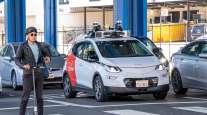Bloomberg News
Congress Wades Into Self-Driving Debate With New House Bills

[Stay on top of transportation news: Get TTNews in your inbox.]
Congress is wading into the debate over whether automakers should be allowed to sell hundreds of thousands of self-driving cars while manufacturers seek federal permission to expand testing of the technology.
The U.S. House Energy and Commerce Committee is scheduled July 26 (10:30 a.m. ET, watch here) to consider two pieces of legislation that would increase the number of cars exempt from federal motor-vehicle safety standards requiring human drivers. Under one proposal sponsored by Rep. Bob Latta (R-Ohio), the figure would rise to 100,000 within four years. Under the other, sponsored by Rep. Debbie Dingell (D-Mich.), it would increase to 80,000 over an eight-year span.
Currently, each automaker is allowed to produce 2,500 self-driven vehicles for testing. Supporters of higher production ceilings argue that the U.S. risks falling behind China in the race to develop the nascent technology. Automakers have pressed Congress to greatly expand their ability to test and eventually sell self-driving cars for years.
“If U.S. policymakers do not support the development, commercialization and acceptance of automated vehicle technologies, our nation risks becoming dependent on foreign sources in a future defined by others,” John Bozzella, CEO of the Alliance for Automotive Innovation, wrote in testimony submitted to the committee for the hearing.
Bozzella’s trade association represents major automakers such as Ford Motor Co., Stellantis NV, Honda Motor Co. and Toyota Motor Corp. Dingell said lawmakers on both sides of the political aisle are hoping the July 26 hearing jump-starts a discussion over federal self-driving legislation that has been stalled for years.
NEW #AV letter to @USDOT @CommerceGov @WhiteHouse →
“…the ability of the U.S. to preserve its leadership in AV technology is in jeopardy due to the lack of a clear federal regulatory approach and framework that supports U.S.-based AV deployment at scale.” — Alliance for Automotive Innovation (@autosinnovate) July 25, 2023
“Everybody wants a bipartisan bill,” she said in an interview. “We want to know what stakeholders like, what they don’t, what they wanted struck.”
Prior attempts to pass self-driving legislation have been ensnared in debates over who to blame — or sue — when someone gets hit by an autonomous vehicle, or AV. Safety groups in Washington say such issues remain unsolved.
“Any legislation should not erode current federal safety standards, should not allow for tens of thousands of AVs to be exempt from safety regulations, should not restrict states and localities from taking action to protect their residents and visitors, and should not allow AV manufacturers to deploy and sell their vehicles without needed oversight and accountability,” Cathy Chase, president of Advocates for Highway and Auto Safety, said during a virtual press conference on July 25.
20+ leading safety, consumer, public health, pedestrian, bicyclist, motorcyclist, crash victim and other orgs sent a letter to the House E&C Subcommittee on Innovation, Data, and Commerce which plans to hold a hearing on 7/26 on future deployment of AVs.https://t.co/WzmwQ2L4au — Advocates (@SafeRoadsNow) July 19, 2023
Peter Knudsen, director of communications for the American Association for Justice, which has lobbied against efforts to shield carmakers from lawsuits arising from self-driving accidents, said Congress should settle the liability issues before moving forward with either of the new proposals.
“In addition to strong safety measures, legislation must define who the driver is and ban the use of forced arbitration,” Knudsen wrote in an email. “We must ensure safety and accountability are at the forefront as this immature technology continues to evolve and proliferate.”
Want more news? Listen to today's daily briefing below or go here for more info:




